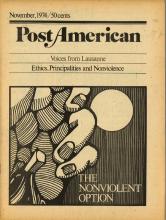The Post-American began, as some of you will remember, as a quarterly tabloid in the fall of 1971 while most of us were still students at Trinity Evangelical Divinity School in Deerfield, Illinois. We moved into Chicago two years ago and now publish the Post-American as a monthly magazine from the context of a community of people seeking to share their lives together. The community, which has gone through many growing pains, is in a period of building and growing in the confidence that God has a future for us together. The everyday realities of Uptown, Chicago, have provided a sobering environment from which to publish the Post-American and it is teaching us many lessons about the meaning of the gospel in our own quest for discipleship.
For many months, the editorial staff and contributing editors to the Post-American have been engaged in review of the publication, which is now three years old. We have given much thought and prayer to questions regarding future directions and plans for the Post-American. Continued feedback from an involved readership has given shape to our discussions. Because we are a reader-supported publication, we felt it vital to share with you the progress of these discussions and the needs now facing the Post-American.
Read the Full Article
To continue reading this article — and get full access to all our magazine content — subscribe now for as little as $4.95. Your subscription helps sustain our nonprofit journalism and allows us to pay authors for their terrific work! Thank you for your support.
Already a subscriber?
Login
